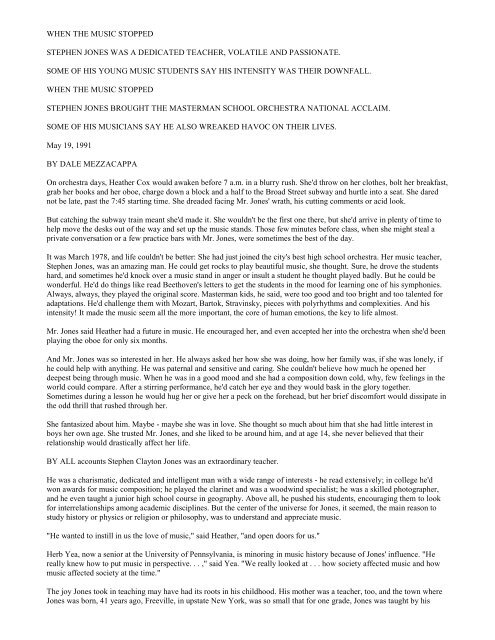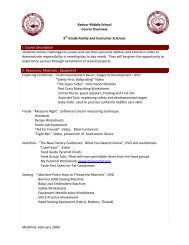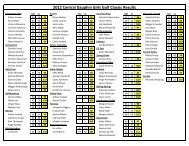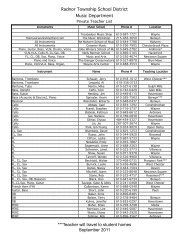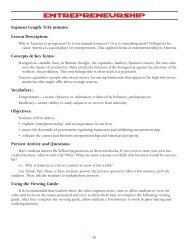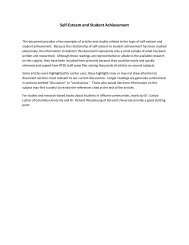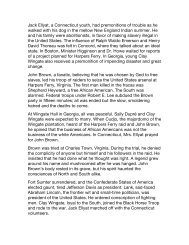WHEN THE MUSIC STOPPED - Radnor School District
WHEN THE MUSIC STOPPED - Radnor School District
WHEN THE MUSIC STOPPED - Radnor School District
- No tags were found...
Create successful ePaper yourself
Turn your PDF publications into a flip-book with our unique Google optimized e-Paper software.
<strong>WHEN</strong> <strong>THE</strong> <strong>MUSIC</strong> <strong>STOPPED</strong>STEPHEN JONES WAS A DEDICATED TEACHER, VOLATILE AND PASSIONATE.SOME OF HIS YOUNG <strong>MUSIC</strong> STUDENTS SAY HIS INTENSITY WAS <strong>THE</strong>IR DOWNFALL.<strong>WHEN</strong> <strong>THE</strong> <strong>MUSIC</strong> <strong>STOPPED</strong>STEPHEN JONES BROUGHT <strong>THE</strong> MASTERMAN SCHOOL ORCHESTRA NATIONAL ACCLAIM.SOME OF HIS <strong>MUSIC</strong>IANS SAY HE ALSO WREAKED HAVOC ON <strong>THE</strong>IR LIVES.May 19, 1991BY DALE MEZZACAPPAOn orchestra days, Heather Cox would awaken before 7 a.m. in a blurry rush. She'd throw on her clothes, bolt her breakfast,grab her books and her oboe, charge down a block and a half to the Broad Street subway and hurtle into a seat. She darednot be late, past the 7:45 starting time. She dreaded facing Mr. Jones' wrath, his cutting comments or acid look.But catching the subway train meant she'd made it. She wouldn't be the first one there, but she'd arrive in plenty of time tohelp move the desks out of the way and set up the music stands. Those few minutes before class, when she might steal aprivate conversation or a few practice bars with Mr. Jones, were sometimes the best of the day.It was March 1978, and life couldn't be better: She had just joined the city's best high school orchestra. Her music teacher,Stephen Jones, was an amazing man. He could get rocks to play beautiful music, she thought. Sure, he drove the studentshard, and sometimes he'd knock over a music stand in anger or insult a student he thought played badly. But he could bewonderful. He'd do things like read Beethoven's letters to get the students in the mood for learning one of his symphonies.Always, always, they played the original score. Masterman kids, he said, were too good and too bright and too talented foradaptations. He'd challenge them with Mozart, Bartok, Stravinsky, pieces with polyrhythms and complexities. And hisintensity! It made the music seem all the more important, the core of human emotions, the key to life almost.Mr. Jones said Heather had a future in music. He encouraged her, and even accepted her into the orchestra when she'd beenplaying the oboe for only six months.And Mr. Jones was so interested in her. He always asked her how she was doing, how her family was, if she was lonely, ifhe could help with anything. He was paternal and sensitive and caring. She couldn't believe how much he opened herdeepest being through music. When he was in a good mood and she had a composition down cold, why, few feelings in theworld could compare. After a stirring performance, he'd catch her eye and they would bask in the glory together.Sometimes during a lesson he would hug her or give her a peck on the forehead, but her brief discomfort would dissipate inthe odd thrill that rushed through her.She fantasized about him. Maybe - maybe she was in love. She thought so much about him that she had little interest inboys her own age. She trusted Mr. Jones, and she liked to be around him, and at age 14, she never believed that theirrelationship would drastically affect her life.BY ALL accounts Stephen Clayton Jones was an extraordinary teacher.He was a charismatic, dedicated and intelligent man with a wide range of interests - he read extensively; in college he'dwon awards for music composition; he played the clarinet and was a woodwind specialist; he was a skilled photographer,and he even taught a junior high school course in geography. Above all, he pushed his students, encouraging them to lookfor interrelationships among academic disciplines. But the center of the universe for Jones, it seemed, the main reason tostudy history or physics or religion or philosophy, was to understand and appreciate music."He wanted to instill in us the love of music," said Heather, "and open doors for us."Herb Yea, now a senior at the University of Pennsylvania, is minoring in music history because of Jones' influence. "Hereally knew how to put music in perspective. . . ," said Yea. "We really looked at . . . how society affected music and howmusic affected society at the time."The joy Jones took in teaching may have had its roots in his childhood. His mother was a teacher, too, and the town whereJones was born, 41 years ago, Freeville, in upstate New York, was so small that for one grade, Jones was taught by his
mother. Jones attended Ithaca College, one of the leading music schools in the country, and did eight weeks of studentteaching in instrumental music for the Williamson <strong>School</strong> <strong>District</strong> in Williamson, N.Y. He married and came toPhiladelphia to get a master's degree from Temple University's music program, which he received in 1973.In Philadelphia, he began as an "itinerant," a music teacher who travels from school to school giving private and semiprivatelessons. At first he divided his time between Greenfield Elementary <strong>School</strong> and Masterman - which was then, as itis now, one of the most sought-after schools in the city.The Julia R. Masterman Demonstration <strong>School</strong> was established in the 1950s, at 17th and Spring Garden Streets, to"demonstrate" model and pioneering educational practices. Teachers must pass special tests and get the approval of theprincipal before being assigned there, while students must score high on citywide tests and show academic excellence.For most of its history, the bulk of its 1,000 to 1,100 students have been in the fifth to ninth grades. And almost since itsfounding, it has been a jewel in the public school system. The students who passed muster were eager to please parents andteachers and to succeed in school.Jones was accepted to teach full time at Masterman right around the time that Melvin K. McMaster, principal of the schoolsince 1968, began phasing out the early elementary grades and adding a small high school program. He wanted to provide,as an alternative to the better-known Central and Girls High <strong>School</strong>s, a small, personalized, co-ed atmosphere that wasacademically rigorous. In 1976, McMaster offered a small 10 th grade, and in 1979 the school graduated its first 12th-gradeclass, of 30.Under Jones, the music program quickly became the centerpiece of the new high school, establishing itself as one of thebest in the city. Jones seemed to work miracles: He once had a student playing cello in the orchestra after only two weeksof instruction, and had a fifth grader as second clarinet. Parents urged serious music students to stay at Masterman to takeadvantage of his tutelage.As the orchestra's reputation grew, it was invited to compete at regional and national conferences of the National MusicEducators Association. Jones started a chamber orchestra, a woodwind quintet and a string quartet for the best of the best,and those, too, gained citywide and even national prominence.One former Masterman student remembers as a fifth grader listening to the orchestra rehearse Bach's Fugue in G Minor. "Itwas so different from anything you had experienced in your whole life," she said. The excitement, the glory of the music -it sounded so wonderful that she decided to take up a musical instrument then and there. Heather Cox recalls concerts inwhich she was "expressing and emoting in a way that I had never done before in my life. There were times I felt fused withthe other musicians."Jones did not simply create an exceptional music program; he created an elite corps of musicians within the school. Jones'orchestra became something to aspire to, and music students would practice even in the hallways and stairwells, usingevery bit of available space and filling Masterman with sound.AFTER HER 1981 graduation from Masterman, Heather Cox found it hard to break the emotional ties. And she justcouldn't get her life started. After two years she left Mount Holyoke College and her music major, emotionally distraughtand nearly flunking all but her music courses. She did no dating; she couldn't relate well to men. In 1984, she soughthelp in therapy. Slowly, her eyes began to open.At a Christmas party three years later, she ran into another former Masterman student, a woman a few years younger thanshe. They started talking music, and then about Mr. Jones. Both fell silent for a second, fumbling for words. Theconversation became increasingly uncomfortable until Heather realized something was drastically wrong, something thatwent way beyond herself.In the new year, she called Sondra Segall. A grade level apart, they had known each other at Masterman, but they'd beenrivals more than friends; around Jones, everything was so tense, so competitive.For a while, Heather beat around the bush. Some of us had certain experiences. . . . I've been calling around. . . .Finally, Sondra broke the ice. The words came out protectively."Did he touch you?"
SWINGING doors set off the first-floor music corridor from the rest of the C-shaped school building. The corridor containstwo classrooms, music lockers, the entrance to the backstage area and - in a secluded place off the stairwell - the smalloffice of the music director.This spot became a hangout. Against school rules, students ate lunch in Jones' office or back stage, sticking around evenduring private lessons. Far from frowning on such behavior, Jones seemed to revel in it. He told students to accept him as afriend."He certainly portrayed an image of 'us' (music students and teacher) versus 'them' (the school administration)," Sondrawrote later. "He often made fun of the principal, the vice principal, and teachers of academic subjects."Jones would tell dirty jokes and talk openly about sex. Many students were titillated and flattered that their teacher sawthem as so grown up. They regarded it as part of his unorthodox persona, even part of his genius."It was so natural," said Herb Yea. "We'd be sitting there, the guys would get there early. And he'd say, 'My wife, wehaven't had sex in X months.' It struck me as odd. Teachers normally don't talk about things like that to students."But he had a way of winning your trust. He seemed like a friend more than a teacher. He set aside rules. He was veryinformal, he'd say, 'Any time you have a question, ask. I'm very understanding.'"So when he would make a comment like that, we'd figure, it's Mr. Jones being like us. In the 10th grade, it's normal forguys to tell stupid jokes about sex. We would think, he's just joking around with us."Jones once described himself as "just about the best rehearsal technician I know." But he also had a fierce temper. He'dthrow things or yell insults - "You think just because you're first chair you don't have to practice!" - and make studentscower in their seats."Orchestra practice was a nightmare," wrote 1986 graduate Nadja Simon in college. "I dreaded trying to play and fearedmessing up. If I did, he made sure the entire orchestra knew it. His reputation for having a temper equaled his reputation asa conductor. A cello once found its way out of a closed window because of sloppy playing. "On the other hand, his students had enormous privileges. He didn't report students who cut classes to hang around with thein-crowd, and he would regularly pull students out of class for music lessons, rehearsals, or private chats in his office.While some of this wasnecessary because there were no scheduled music-performance periods, Jones' reasons were not always musical. Once, hegave a birthday present to a student: a package of signed ''cut slips" for use at will.Masterman students, especially the most talented musicians, were usually so bright that they could skip class and still passeasily. But this flouting of authority suggested contempt for other classes. Other Masterman teachers rarely said anythingbecause of the high status the music program enjoyed - and Jones' power within the school.Said Terry Rasi, a French teacher: "Steve, no matter what he did, it was overlooked and sanctioned because of the fact thathe produced."Jones was seen as a loner who didn't socialize with other faculty members. Near the end of his time at Masterman, someteachers began to dislike him."He became consistently more judgmental about kids," said Ginny Coco, head of the health and physical educationdepartment. "He'd say, 'This one's a mess, that one shouldn't graduate, why is this one here?'"TWO MO<strong>THE</strong>RS OF Masterman students found themselves frequently on the phone during the winter of 1987-88. Bothhad respected and admired Stephen Jones, had viewed him as a talented and selfless teacher who had given their daughtersan incomparable gift.But one of the two mothers had been anxious since that evening in her kitchen in the fall of 1987 when her daughters,offhandedly almost, set her straight. Mr. Jones wasn't all you thought he was; if you only knew what he put us through. Themother was dumbfounded. Both girls had had only praise for Jones while they were his students. But then she recalled thatseveral years before, her younger daughter had wanted to leave the orchestra. The mother had actually flared in anger:"After all Mr. Jones has done for you?" Now, though, she was alarmed.The second mother had been getting similar mixed signals from her own daughters, but put out of her mind the occasionalhint of a dark side to Jones. She was perplexed when, for no apparent reason, Jones dropped her older daughter in the girl's
junior year from all-city orchestra; the girl was upset, but never said a word against her teacher. Things began to crystallizefor the mother when one of Jones' other students worked with her over a summer in the same office. "I wouldn't let my littlesister stay at Masterman," said the student, Sonia Kleindorfer. "I don't want her to get messed with by Mr. Jones."Then Heather called. The mother tried to poke holes in Heather's story. But she remembers her heart thumping in her chest.HEA<strong>THE</strong>R HAD BEEN tracking down other women, and on a hot July 1988 evening, about 20 former Masterman musicstudents and a few of their parents congregated nervously in a West Philadelphia office building. What they had come to dowas neither pleasant nor easy. But once they started talking, Heather said, "it was like the floodgates opened."Susan Simon, a professional oboe player, accompanied her daughter Nadja. She had prepared herself, but still it waschilling. Simon watched as each girl entered the room: flutists, oboeists, violinists, French horn players, bassoonists,cellists. Some had graduated from high school as long ago as 1980 and some as recently as 1987. She shuddered.And her horror only grew as they spoke. As inexperienced junior high and high school girls, they said, they'd been inspiredand manipulated by their music teacher at the Masterman <strong>School</strong>. At a particularly vulnerable period in their lives, theysaid, they were victimized by an adult who cultivated their trust and then betrayed it.WITH A SELECT group of girls, Jones' behavior displayed a consistent pattern."It was much more than simply touching students," said Sondra Segall, who graduated in 1980. "What it is is totalpsychological domination, and it started in subtle and seemingly innocent ways. After we compared stories, it was clearthere were patterns. Each one of us thought we were the only one. Each thought, however strange, that it was a loveaffair."Music teachers are often alone with students, and the secluded location of Masterman's music office made inappropriateactivity easy to hide. Private lessons for his favorite students would often start with a hug. "He would make commentsabout my hair or clothes and ask questions about my friends or boyfriends," recalled Nadja Simon, who began oboe lessonsin seventh grade.Gradually, the hugs would get longer and more intimate. Then, there would be kisses."He was the first person I had ever romantically kissed," wrote Nadja of her experiences. "He started calling me out ofclasses more often, and our 'talks' got longer and longer. My friends started noticing my disappearances, and several ofthem warned that Mr. Jones was a 'dirty old man.'"Sondra Segall believed Jones encouraged students to think of such conduct as normal:"I distinctly remember a time when (a female student) sat on his lap. I seemed to be the only one in the room who thoughtthat this was strange. At the time, she was still a little girl in many ways, and probably not entirely too old for 'Daddy's lap.'This incident had a significant impact on my outlook. The display of affection seemed so innocent and accepted that Iassumed that my discomfort was due to my own uneasiness with public displays of affection. I, in fact, determined that itwas my own 'dirty mind' and inhibitions that made me think that this was wrong."Not long afterward, Sondra herself was the subject of affectionate acts."One afternoon, as I was leaving Mr. Jones' office, which was filled with the 'lunch crew,' he came up behind me in thefoyer and kissed the nape of my neck. I do not know if any other students observed this incident. It was all I could do topretend to him, and, more significantly, to myself, that this was not a big deal and nothing more than the affection I hadseen him display with other students. This was the first time that I ever experienced a hint of what I much later came toknow as sexual arousal. I had no idea, at the age of about 14, what to do with these feelings, so I tried to deny theirexistence."After this initial entree, the kissing intensified."One Friday afternoon, in late May or early June of 10th grade, Mr. Jones and I were alone in his office after school,probably after a music theory class. He kissed me. I stood frozen as I watched him, in what seemed to be slow motion, openhis mouth, curl up his tongue, and come closer and closer. He slobbered all over my face because I did not open my mouth.I was quite naive and was not aware that people opened their mouths when they kissed. I cannot begin to describe theemotions that nearly exploded out of me at that moment. I could not believe that this was really happening. It wasphysically painful to experience my own suppression of the feelings that I was not prepared to allow to run free. I was 15.
"The following Monday we talked about the incident and arrived at the conclusion that it should never have happened. Ashe drove me to the subway station, I assured him that I would not tell anyone. . . . I thought that I was protecting him frombeing destroyed by a moment's indiscretion. Little did I realize that this statement would encourage future advances."Shortly thereafter, Mr. Jones had an extra ticket to a baseball game and invited me. This did not seem unusual to me, as Ihad known him to take other students to baseball games. After the baseball game, he kissed me in his car. This time Iresponded the way I thought I was supposed to, by following his lead. He also touched my breast through my clothing. Myeyes were closed, and suddenly, his hand was on my breast. I remember being disturbed by this. I never had the opportunityto voice an opinion regarding whether or not it was all right for him to touch my breast. I had previously decided that if itwas, in fact, true that men touched women's breasts, then I would resist any such advances before they were carried out. Inmy naive, confused, juvenile outlook, I felt that once a private part of my body had been touched or exposed, it was nolonger 'virgin,' and therefore, I somehow felt that I no longer had the right to say, 'I don't do this.'"Other students described similar experiences.Heather said that once, in late 11th or early 12th grade, she was in the ''green room" on the side of the stage with Jones,working on solos for the orchestra. "He came up behind me, pulled my head back and kissed me full on the lips. . . . Itflipped me out. He said, 'I shouldn't have done that, should I?'"After that, there was more hugging. In the 12th grade, it got more intense. ''In the spring of my senior year, I couldn't takethe jealousy. I told him, 'I have a crush on you.' It was right before the prom. Instead of doing the responsible thing andputting me in my place, he didn't do that. I asked him if he was mad. He said, no, he was very happy."A few days later, he said, 'I wish I could be your prom date, but you know I can't.' He kissed me on the lips. My lips werefrozen shut. He kissed me a few more times. I realized he wanted to teach me how to kiss. He told me to relax . . . heproceeded to demonstrate. I was following along."There were other kissing episodes after that on a fairly regular basis in his office after school, she said. "Part of meresponded, but another part shut down. I felt out of my body. I knew it wasn't right, but I didn't know how to cope."When he asked me to sleep with him, I spent three days agonizing. Finally, he said, 'This isn't right, is it?' I didn't feel I hadthe power to say no. I felt only he could do that."As destructive as the sexual contacts, said some of Jones' students, were what they considered his encouragement ofjealousy and competition and the ''mind games" he played with them."I would show up in the orchestra. It would be Jacqui Day," said Jacqui Grasso, a 1981 graduate and French horn player."All of a sudden I looked nice, every note I played was beautiful, boy, she is something else, isn't she? You being insecure,whatever strokes we would get, we would take. I'd have a couple of days like this, then all of a sudden you were alienated,the brunt of jokes in front of your peers. You couldn't do anything right. He did not have time for you, he didn't want to talkto you. He'd smirk at you, you think you know so much, you're just a mere instrumentalist. There were even slyinsinuations, you think you will make it in this business. For some of us, it was psychological abuse; for some,psychological and sexual. I was one of those people. "Heather was, too. She said the emotional roller-coaster ride gave her migraines. She felt isolated and alone, incapable oftelling even her parents.Sonia Kleindorfer had a different kind of experience. Sonia, a 1984 graduate, said that Jones would call her out of class toconfide his marital difficulties. He would discuss one of her classmates, with whom he said he was having a relationship,and ask Sonia for her advice.At the time, as a 16- and 17-year-old, Sonia explained later, she indicated no disapproval because she felt the young womanwas mature enough to control her own life. "I thought she was in love with him. . .," Sonia said. "I thought she must knowwhat she's doing. She didn't."Jones also wrote letters to students over the summer. Sondra received six in one month between her sophomore and junioryears. In these letters, Jones encouraged her in her studies, discussed Renaissance music, expressed derogatory opinions ofother students and made suggestive comments. Sondra had written that she had mosquito bites on her neck. He wrote back:"You shouldn't talk about the nape of your neck and mosquitos that way, it turns me on!!" Then he added, "Sorry aboutthat."
Jones maintained other contacts with students out of school: Several baby-sat for him and helped his family move into anew house. Parents would invite him to dinner, and he would praise their daughters. He even referred students to SusanSimon, Nadja's mother, for oboe lessons."He had the parents all baffled also," said a Masterman mother. "He would call here. I think I would have considered him tobe a friend as well as a teacher. . . . That was the real upsetting thing. They (her daughters) didn't say anything. They knewhow much I thought of him. Without knowing what the man was doing, he was a man you would admire. Had I had theleast idea, I wouldn't have given him any admiration at all."At the same time he was befriending parents, students said, he was usurping the parental role of adviser."If you were a normal adolescent, you felt alienated from your parents, and at those points he would jump in and be asurrogate parent. . . ," Jacqui Grasso said. "He'd say, 'Parents can't understand you all the time. There are times you have togo out on your own and figure things out.' He'd soothe you and justify you hating your parents. As you got closer to him,you'd be on his side. And you'd be more available to him, vulnerable to him, and he'd work his way in. He'd get what hewanted psychologically, sexually, musically, all of the above."And each student thought she was the anointed favorite."I had no idea how many. I really thought I was the only one," said Jacqui. "I had known about Sondra at one point while inschool together. There was an isolated incident. Actually, he told me about it. I was under the impression that I was theright-hand woman," but, she concluded, there were lots of "right-hand women."The students said Jones encouraged silence about his behavior. "He set you up," Nadja said. " 'If you say anything,' he'dsay, 'my wife will kick me out, they'll take away my teaching certificate, teachers will hate you for destroying theorchestra.' I felt trapped. I also felt alone. I felt I was the only one. I had no idea there were so many people. There was noway I was going to destroy Masterman if I was the only one."After her sophomore year, Nadja left Masterman for Central (which had just become co-ed), primarily, she says, to getaway from Jones."I really didn't know how to say no," said Sondra. "I really admired him, loved him, wanted to please him. You have tounderstand, I wasn't actively participating, I was passively participating. The same person who was causing the problem, Iwould look to in a different role to help me deal with it. It was perverse."As the girls were coming into favor, he'd praise their talent and give them roles in the orchestra perhaps beyond theirabilities; Sondra said that her private flute teacher never thought she was progressing as well as Jones did. And if theyrejected his physical advances, or stood up to his harsh words, they said, their musical careers would suffer. Sondra startedpulling away in the 12th grade."My stock in the orchestra fell. All of a sudden, somebody else was playing solo. All of a sudden, I was not getting goodgrades in music history. In the 12th grade, I didn't care about the orchestra. I moved back on the fringes."Talking to the other students later, said Jacqui, made her fully realize the hold Jones had over them."Our relationships with him had a kind of mind-melding aspect to them," she explained. "You sort of felt like, 'I'll die if Idon't have him.' You felt so incomplete yourself, you felt that if you were apart from him, you'd expire."Said Sonia Kleindorfer: "The most dangerous part of physical or emotional abuse, as a teacher, is when you isolate youngpeople in the way that he did, or isolate the orchestra from the school as a whole. That's a very important social age inmaking contacts, feeling at one with your peers. . . . But he took people out of that situation and made you feel older,special. Then when you lose his attention and compliments, you're alone and you don't know what to do."AT <strong>THE</strong> JULY meeting, amazement and tears at hearing the same story over and over turned into anguished conflict overwhat to do next.Some of the students, mostly the younger ones, were extremely concerned for Jones, his family and his reputation. Theywanted him out of the classroom, but in a way that wouldn't hurt him."They felt he made a tremendous contribution to their lives through music and gave them a part of themselves that theycould cherish and recognize and take with them for the rest of their lives," said Nancy Fisher, a social worker a parent
ought to the meeting. "They felt they had something positive and good they would not have experienced were it not forthis man."There was another group, mostly older, whose anger was so strong that, in Fisher's words, they "wanted to string him up byhis toes." A third group wavered somewhere in between. One young woman admitted to an intensely physical andemotional relationship with Jones. After declaring that she wanted to get on with her life, she left the room in tears. Shenever contacted the group again."I wondered, where do you go with people with this amount of diversity?" Fisher recalled. "By the end of the meeting, Iwas convinced that action was impossible."Still, they pressed on, calling lawyer Patricia Pierce for advice. Some feared that if they made their experiences public, theywould become victims again, attacked by family and friends for being "so stupid, such a pushover." Nadja Simon later toldabout imagining herself sitting on a witness stand before an aggressive lawyer. "It's really easy to turn the whole thingaround and say it was all your fault. 'Didn't you let him, lead him on? You never said no? Why did you baby-sit for him?Why did you let him call you on the phone? Why did you stay in the orchestra? Why didn't you say something to the otherteachers?'"I was 14 and very small. He was big and 35 years old. He was powerful. If I said something, why would all the teachers,parents, the whole school believe me? It would be my fault if I had brought this out . . .destroyed the orchestra, thiswonderful teacher. . . ."Meanwhile, a member of the Board of Education who learned of the meeting told a concerned parent to contact RhondaLauer, then an assistant to Ralph Smith, school district chief of staff.Lauer, a former school principal, remembers her shock at the accusations - that so many women spanning so many years atthe school had come forward, and that neither parents nor any one at Masterman had suspected a problem.More than a dozen students agreed to give statements detailing abuse by Stephen Jones at Masterman. Some wrote themdown, some talked to Patricia Pierce, some spoke to school district investigators. The Sex Crimes Unit of the PoliceDepartment was also called.On Aug. 10, 1988, Stephen Jones was summoned to principal Melvin McMaster's office, where George Branch, then theacting director of school district personnel, was also present. McMaster summarized the allegations and handed Jones thestudents' signed statements. Jones read them. According to McMaster, Jones then said, "I guess I'd better resign."Within the week, he turned in his letter of resignation to the Board of Education. He never confirmed or denied theallegations. Nor did he fight for his job. The school district began proceedings to revoke his teaching license due toimmorality. He surrendered his license the following spring, in 1989, ''in lieu of revocation," and notification of that factwas sent to the department of education of every state in the country. Because Jones chose to resign and gave up his licensevoluntarily, there was never a formal hearing before the Board of Education or the state to determine if he was culpable.Nor was Jones ever charged with a crime. Two years is the statute of limitations for misdemeanor sex offenses. Policeinvestigators could not find any students or former students willing to testify against him about potentially criminalexperiences within the previous two years. Many of the young women who had come forward were frustrated that the legalsystem could do so little for them.But they did achieve their primary purpose. When Masterman opened in September 1988, Jones was gone.MOST OF <strong>THE</strong> students who came forward believe their problems deepened after Masterman. There have been bouts ofanorexia and bulimia, destructive relationships, professional drift, years of therapy. Such delayed reaction, experts say, istypical."It's like post-traumatic stress syndrome," said Elena Marie DiLapi, the director of the Women's Center at the University ofPennsylvania and a social worker who has counseled hundreds of those she calls abuse survivors.For all sexual abuse victims, DiLapi said, at first there is usually denial and disbelief, which can last for months or evenyears. And when an adolescent has been abused by someone who has power over her and who she believes will alwaysbehave appropriately - someone like a teacher - the disbelief and inability to recognize the abuse is much worse. Such arelationship violates boundaries the way incest does.
Usually, DiLapi said, the young woman goes through periods of guilt and self-blame. "Women take it out on themselves,"she said. "There could be a change in eating patterns, lack of sleep, loss of ability to concentrate. It can affect futurestudies." And sometimes, she said, the women don't even make the connection between their distress and what happened tothem.Said Jacqui: "I thought, once I left Philadelphia, I'd be absolved from the pain and stress and confusion. I found out that wasjust the beginning."Jacqui went on to study music at Jones' alma mater, Ithaca College. ''People would say, 'I heard he has a wonderfuldepartment.' I'd think, If you only knew." When she sought therapy, she spent months lying about what really happened."Steve's influence, he'd say, 'You can't tell your therapist.' I was still buying into his act, his lies. It was difficult. I still feltthis loyalty towards him. But I had a great therapist. As I started detaching, I realized I'd been in pain a long time over thisguy."Other students said they found themselves pursuing damaging relationships."In my sophomore year in college, I got real depressed and I didn't know why. . . ," Nadja said. "It was hard for me to behappy. I had bad relationships with men. I went through a period of two-week relationships with people. I felt ugly, fat,unattractive. I had a nasty bout of compulsive overeating."Not until later did she decide that these symptoms were connected to her relationship with Jones. "I figured it was over, thatit had happened a while ago, and there was nothing I could do about it," she said. "But then I found out so many otherswere involved, and what I was experiencing was typical."Sondra described more intense difficulties."When I was in college, I started to eventually realize that what Mr. Jones had done to me had been wrong, damaging, anda betrayal of trust," Sondra wrote. "Unfortunately, I always felt that it had been as much my fault as his, for not making himstop. I became very angry, but did not know what to do with my anger. I turned the anger inward, and it metamorphosedinto depression. I pursued a pattern of self-destructive behavior."Sondra said she fell into a pattern of getting involved with "unattainable men who could only hurt me," at one pointbecoming obsessed with an alcoholic. She said she started drinking heavily, experimenting with drugs and had thoughts ofsuicide."I was completely unable to concentrate on my work during the first two years of college. If it were not for a year oftherapy, I probably never would have graduated."Heather, normally a top-notch student, "lost all interest in academics," she said. Unlike some of the others, she continued tostay in contact with Jones, who, she said, would confide his feelings for a younger student."In the pattern established with (Jones), I was completely dominated, I was there to please the man," she said. "A 'lovesituation' involved giving a lot, getting very little back, but that was OK. It was also more fantasy than real life. I chosemen, in two or three attempts, men who were usually involved with other people. I was the second or third wheel. I wouldcreate a relationship in my head."Finally, she began to get counseling. As she recovered, she completed her last two years at Earlham College in Indiana,ultimately graduating Phi Beta Kappa with a degree in peace and global studies in 1987.One Masterman graduate is pursuing a career in music teaching. That made it even harder for her to come to grips withwhat had happened: She felt she owed Jones something. She started to get counseling only when she began helping to tellauthorities about Jones' behavior. That brought out the guilt and inner conflict."I feel weird being in this career," she said. "I had felt there was still some connection to him. But over the past two years,I've convinced myself that it was his job to teach music, and that I'm not in debt to him."Heather said that she agonized over taking steps to remove Jones from teaching because "he had genuine feeling. . . . That'swhy it takes so long. . . . How do we sort out the good from the other stuff?"In the aftermath of their relationships with Jones, Jacqui said, she and the other students "have spent years figuring out whatlove really is. . . . We're still grappling."
MASTERMAN, TOO, IS STILL grappling.The teachers and students who returned to the school in the fall of 1988 knew only through rumors why Jones was nolonger there. One music student, now a junior, bounded into the building and said to a friend, "I can't wait to talk to Mr.Jones," only to be told, "He's gone."She was shocked. But beyond a meeting or two in which Melvin McMaster made an oblique reference to "unprovenallegations that we're investigating," very little information was forthcoming.McMaster, a no-nonsense principal who ran a tight ship, wanted to keep the matter as quiet as possible. He said, in aninterview in the summer after Jones left the school, that he didn't see the need to "belabor the point."The school district brought in Carol Tracy, the executive director of the Mayor's Commission on Women, to help deal withthe situation. To her, McMaster seemed paralyzed. She said he was properly concerned not to say too much about Jones inthe absence of legal charges. But she and others also said he seemed to underestimate the long-lasting damage this kind ofincident can cause, especially if it is not frankly confronted. "These stories have to be told," she said. "Telling the stories inthe public arena frequently causes pain . . . (but it also) gives strength to other people to understand that they are not unique,that it is not their fault."Under parental pressure, at a Home and <strong>School</strong> Association meeting in October, after Jones had left, McMaster outlined thesituation. He sought and got a vote of confidence to proceed as he thought best.Women Organized Against Rape came in December and stayed for two weeks, holding sessions in each classroom onrecognizing and resisting sexual abuse. Professionals from the University of Pennsylvania Women's Center and the Mayor'sCommission on Women talked to the faculty. To get WOAR in, Tracy said, ''we pushed and pushed and pushed."McMaster, she came to think, was also a victim. "It took a lot of convincing McMaster to 1) address the thing, and 2) gethim to do something. . . ," said Sue Becker. Becker was a member of the Women's Way board and a parent of a youngerstudent who was not in the orchestra. "He just wanted it to not have happened. He didn't want his school looking bad."McMaster recalls his efforts differently. He said he responded to parents and discussed the issue at meetings. He made sure,he said, that each and every student was aware of what help was available. Faculty members, he said, were told details ifthey had a "need to know.""He told us Jones was no longer with us," said Ginny Coco, the health and physical education department head. "He said itwas not to be discussed, the issue was resolved. He intimated everything was fine, it was business as usual."If anyone had a "need to know" it was Jones' successor as music director, Vincent Maola. And he was told very little. Whenhe asked McMaster why Jones was not coming back, he said McMaster responded, "I think he's leaving education."By talking to colleagues and parents, Maola pieced together parts of the story. He could understand the reluctance of femalestudents to come into his office, but he was totally unprepared for the students' hostility toward him and resistance towardhis efforts to put his own stamp on the music program."A lot of times I couldn't reach kids," said Maola, who joined Masterman after a long career at Olney High <strong>School</strong>. "I havebeen teaching for over 30 years. I kept trying to reach out to kids. . . .But no matter what I would try, nothing seemed towork."In June 1989, <strong>School</strong> Superintendent Constance Clayton announced a massive shakeup of the district. Against his wishes,McMaster was among 26 principals who were transferred to other schools. He is now the principal of Fels in the Northeast,converting the one-time junior high into a small senior high school. <strong>School</strong> officials say that the Jones incident had nothingto do with McMaster's transfer.To succeed McMaster, Clayton picked someone totally different in style, Barbara Bravo, the vice principal of Girls High<strong>School</strong>. Bravo began efforts to involve the faculty and parents more directly in decision-making and activities, reorganizethe school from a junior high to a middle school, and expand the high school program. But everywhere, Bravo confrontedthe still- spreading fallout from Stephen Jones. There was persistent hurt among the faculty, students and parents, some ofwhom were frantic that students still badly needed counseling.Just last June, and nearly two years after Jones left Masterman, the Board of Education authorized $1,100 for two days ofmandatory sessions for students and faculty. In addition to psychologists, several of the young women, including Heather,
Sondra and Nadja, attended the meetings. All 10th to 12th graders, plus all the music students in the younger grades, wererequired to attend. Faculty members said the sessions were cathartic, eye-opening and wrenching."We were still not clear of the extent. . . ," said Coco. "But how many were contacted, how many came forth, over such along period of time . . . we had no idea."Frustration turned into guilt and anger. In hindsight, the other teachers felt blind for not discovering the abuse. One maleteacher was in tears, according to several participants, remembering how one of his students - a music insider - underwent apersonality transformation in her senior year, withdrawing and losing interest in her studies. "I thought it was just a phase,"he lamented. "I never would have guessed."Another teacher implored a former student, "I was your adviser. You couldn't tell me?""I couldn't tell my mother," the student replied. "I couldn't tell myself."Other teachers started re-evaluating their own relationships with students. ''I like to hug students," said one. "What are thelimits?"At an afternoon session with the entire faculty, one teacher blamed the girls for not speaking up. In a shaky, angry voice,Nadja Simon told of how crippling her own sense of guilt had been. She later explained, "I wouldn't consider telling ateacher because they could see what I was, and . . . they knew I was 'bad' - that was my perception. . . . He was so good atkeeping us under his thumb. We weren't blaming them. We wanted them to understand why we kept so silent and why wewere telling them now."Quickly, the atmosphere in the room changed. The victim-blaming stopped.The man who learned most at these sessions was probably Vince Maola. Now, after two years of struggle, he understoodwhy so many students greeted him with hostility; much more was at stake than loyalty to Jones."I tried to develop many different levels of kids, three orchestras and two bands, not the exclusive little club he had going.It was not well received," said Maola. "They wanted that exclusive feeling."Maddie Jane Sobel, a psychologist conducting the sessions, said that the serious, lingering effects were obvious. "Every laststudent, from the ones we saw in the seventh to 12th grades, were well aware of (Jones') inappropriate behavior." And itwas clear, Sobel said, that many had not sorted out their own confusion and pain."He made them special, he gave them the talent," said Sobel. "But his manipulation and control of all of them is stillaffecting them now. He taught them that power rules and, indirectly, that the end justifies the means. They felt fearful,manipulated and ridiculed, and yet they were also special."Elena Marie DiLapi of the Penn Women's Center said, "These students for the rest of their lives will be dealing with this.They are survivors. Those who recognize it, tell about it and do something about it are courageous young women. Whatthey're doing is not only fighting through their own denial, but fighting a society that tends to blame the victim."The reality was that they weren't in control of that situation. He was. He was the adult."HEA<strong>THE</strong>R COX'S OBOE SITS IN its case on a bookshelf in her living room. It's been at least two years since she hasplayed it.She watches it gather dust, unable to put it out of sight or pick it up. It just sits, a graphic symbol of her conflicted feelings."I have a lot of anger left that I'm still struggling to deal with," she said. "My feeling's still kind of in process. I haven't fullydealt with the anger I have towards him."As far as recovery, she feels she's about "halfway there," but will never completely get over it. "I was certainly permanentlychanged by it," she said. "These were my first sexual experiences. I can never go back and relive my first sexualexperiences. These were my first deeply emotional experiences as well. They cannot be relived either."At 27, Heather has made a lot of progress. She feels she's been able to form healthy relationships. "I'm starting to learn howto set boundaries, to set limits, to stay true to what I want, say no when I want to," she said. ''It's still a process, but I'mbeginning to do that more."
She has a good job as a paralegal and is considering law school. She's taking chemistry courses, hoping to reawaken anaptitude for science. She thinks, perhaps, of combining her interests in an environmental law career.And to keep her hand in music, she plays the guitar. But that's not quite enough. Last summer she attended a combinedperformance of the Soviet and American youth orchestras, and the nostalgia it awakened in her was nearly overwhelming."I thought, 'That could have been me, that was me 10 years ago,'" she said. "I miss it. There is still nothing like that feelingof making music with other people in that way."On the other hand, she's doing things now that her obsession with music precluded. "I'm discovering other parts of myselfthat were dormant during that period."Soon, Heather hopes, she will take the oboe out of the case, assemble it, practice her breathing techniques and rebuild herembouchure. She sees herself, one day, playing with a community orchestra."It's something that's a part of me," she said. "But not something I can do right now."HOW THIS STORY WAS REPORTEDTo report this story, Inquirer staff writer Dale Mezzacappa conducted extensive interviews over 2 1/2 years with teachers,parents, administrators of the Masterman <strong>School</strong>, officials of the Philadelphia <strong>School</strong> <strong>District</strong> and of the State Departmentof Education, sexual abuse counselors, and students - five of whom agreed to use their names in this article. Mezzacappaalso reviewed statements students gave to lawyers and school district officials.The Inquirer tried on three occasions during the reporting of this article to interview Stephen Clayton Jones. Each time,through his lawyer, he declined to be interviewed and refused to reveal his whereabouts. It is not Inquirer policy to releasearticles in advance of publication. But earlier this year, The Inquirer sent Jones a letter detailing the information in thisarticle.In response, Jones asked that this statement be published:"The Inquirer has refused to provide me with an advance copy of its story to correct the likely errors it contains. Asummary letter to me from The Inquirer is very vague, contains many inaccuracies and is based on unverified andunreliable information. I now live far from Philadelphia and am unable to protect myself from the result of this story,misinformation to the public and an unwarranted invasion of my family's privacy."


